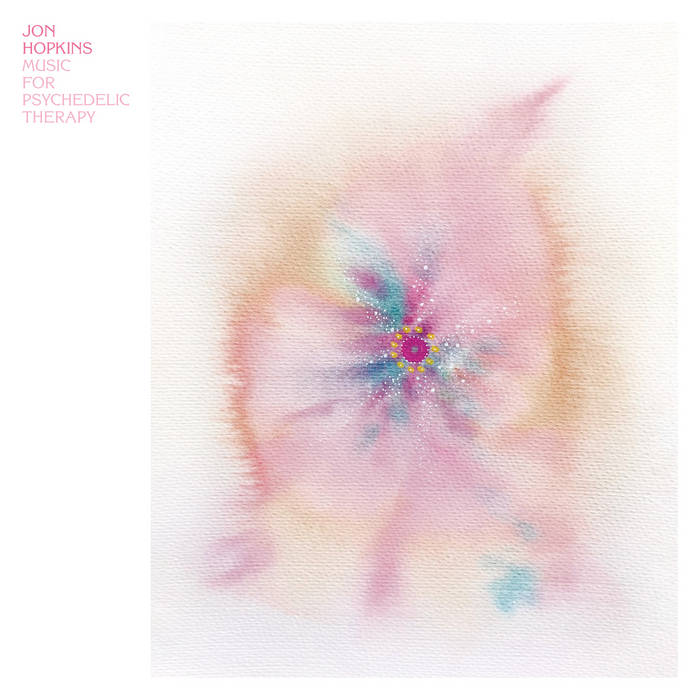
A blend of field-recorded nature and carefully smoothed synthesis, Jon Hopkins puts forth a collection of compositions hailing from an alternate and more humane future. One where medicine has evolved past the current paradigm of treating the body like a car engine, a sick human being as a mere consumer of medical innovation: one based instead on complex systems for communicating empathy through art.
A heavenly, near-cacophony of piano and wind chimes are blown by lavender-scented air. A pitch ascends slowly in the background, like a reverse-psychological Shepard tone. The illusion of it is merely imagined as the two soundscapes wash together into a nacreous glow. On a phospholuminescent wash of white-noise impeded tidal bore, a single note lingers.
The music moves along geographically, such that it is useful to picture oneself as physically moving an avatar through the terrain. It approaches a sacred cascade where a haunted choir is singing from somewhere beyond the mist. This triptych is “Tayos Caves, Ecuador,” parts i-iii. One note drifts meticulously to another, and only a very few make up entire tracks (think Stone in Focus). Slowly, it moves from something like an elegy to something like a paean; our point of view potentially Persephone ascending from the underworld and blinking for one brief moment in the sun. The release is overall highly contiguous, like the long release of a deep breath that acquires new shades as it exits the lungs, drawing poison away along with it. It is more the articulation of a single idea over multiple tracks than a collection of different songs loosely collected by a central motivating theme.
There is a deep question in mathematics that essentially asks whether the field was invented by humans to explain natural phenomena, or if conversely it is an innate system of nature that we merely discovered. Sound design like this asks a similar question, or it erases it completely. Field recordings from nature blend seamlessly with smoothed-out synthesis freely exploring the entire audible spectrum with the natural glide of whale song. There are subtle undercurrents of chirping, trills, sighs, bells, fractal sprays of water, sounds so natural they seem unreal; or else so sublimely crafted they sound like they must belong to the perfect realm of nature.
The title may be the key. This is music hailing from an alternate and more humane future where medicine has evolved past the current paradigm of treating the body like a car engine, a sick human being as a mere consumer of medical innovation. That is to say, this is treatment as a continuous, lifelong process: something conducted biweekly by futuristic, socialist communities of musical therapists, bards, herbalists, and philosophers. It’s not the same as those YouTube channels that post 741 Hz healing energy, which dubiously purport to “remove toxins and negativity.” For one, the music is actually structured and creative. The idea is sound besides: music has been used as a therapeutic tool for centuries.
Sound can focus and transmit emotion like a laser beam, connecting human souls through complex systems of communicating empathy in a language natively understood by our brain. By listening, we engage in remote therapy, healing through shared experience rather than benzodiazepines and selective serotonin reuptake inhibitors. Would such a shift be so ridiculous? What could possibly be more healing than learning to reconnect with each other and with the possibilities of our own minds; with the music of the spheres, and birdsong, and what it actually feels like to live and survive in a modern and highly anesthetized world. This all may sound a lot like faux-Buddhist boomer mumbo-jumbo, and maybe some of it is too optimistic and oversimplified…but I’d rather entrust the future of healing the deep psychic wounds in society caused by technology and a poisonously shallow culture to an artist than to a pharmaceutical executive. The album closes with a long quote from Eastern spiritualist and Timothy Leary affiliate Ram Dass, which perhaps sums up best how it feels to listen to the whole release continuously.
“You aren’t who you thought you were. The real work you have to do is in the privacy of your own heart. Quiet the mind, open the heart. Within each of us there once was a fire. For some of us there seems as if there are only ashes now. Dig in those ashes and you find one ember. Blow on it, it gets brighter. The only thing that’s important is that ember.”
-Winston Mann
Check out Dirty Epic music recommendations here.
Listen to our podcasts here.
Find out more about our events here.

